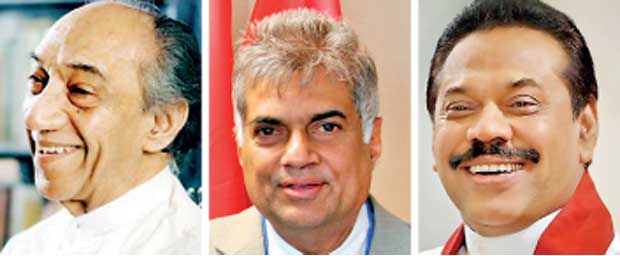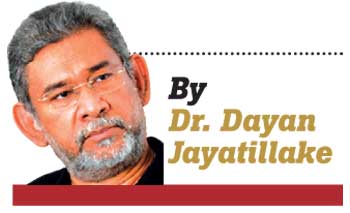Reply To:
Name - Reply Comment
Last Updated : 2024-04-24 06:20:00

 o economic reality dawned and the UNP leadership had to eat humble fortune cookie. China is back in the game in a major way, which is a good thing because it partially and temporarily stabilizes the economic crisis while re-balancing the island’s recently lopsided external relations. Ironically, the restored Chinese footprint may eventually be larger than it was under the Rajapaksa administration.
o economic reality dawned and the UNP leadership had to eat humble fortune cookie. China is back in the game in a major way, which is a good thing because it partially and temporarily stabilizes the economic crisis while re-balancing the island’s recently lopsided external relations. Ironically, the restored Chinese footprint may eventually be larger than it was under the Rajapaksa administration.
The China re-set was inevitable, and only proves the crass unrealism of the Yahapalana ideologues who went on an anti-Beijing binge. The Rajapaksas have been proven right in their strategic assessment that Sri Lanka’s destiny lay in Asia, and that China was Sri Lanka’s most indispensable and valuable friend. But they were wrong in putting all their eggs in the Beijing basket in the postwar second term.
Instead of a policy of multi-polar balancing a Lakshman Kadirgamar (and of course SWRD and Sirimavo Bandaranaike), the UNP-led Government has adopted a policy of multiple and multiplying dependence, lurching drunkenly in one direction and another. With its chronic political dysfunctions and developmental disability, it will beg, borrow and steal, and is parcelling off and selling as much of the country to as many buyers as it can beckon. It is external players rather than the Sri Lankan people and state who will be the biggest shareholders of the country and controllers of its destiny.
Post-Beijing, the Government is likely to overcompensate other external players who scramble to offset the Chinese return. An ethnically bipolar Sri Lanka with (I) its strategic Northern and Eastern border zone constitutionally converted into a mini-Tamil Nadu -- a self-governing federal enclave and penetrable state let and (II) the ‘Hanuman Bridge’ which establishes contiguity with Tamil Nadu and encourages and enables irredentism, are likely give-aways.
Despite the fundamentally positive outcome of Premier Ranil Wickremesinghe’s retreat to China, his most basic thinking and agenda on the axial problem, the ethnic equation, are gravely erroneous. In the path-breaking volume ‘To End a Civil War’, Mark Salter discloses the sharply perceptive observation of the PM’s thinking by Norway’s top Foreign Affairs official engaged with Sri Lanka in 2001-2005:

“… [Vidar] Helgesen came away with the impression that Premier Wickremesinghe’s basic agenda was to ‘let the Tamils have whatever is needed, short of independence’, so that the government could ‘get on with the business of making Sri Lanka the new Singapore’. Wickremesinghe’s essential agenda was to ‘get the economy going—liberalize, privatize’. And in this context, Eric Solheim recalls, the fact that both he [Wickremesinghe] and Helgessen were conservatives, ‘definitely helped’.” (p. 78)
This multiple revelation encapsulates everything that is amiss with PM Wickremesinghe’s thinking. Firstly the PM’s model is wrong. While Singapore is truly admirable as a society—it is the closest I  have seen to Plato’s Republic—its relevance to Sri Lanka is questionable. Singapore, like ancient Athens, is a city state. It has no rural hinterland. It has no peasants. It is utterly atypical for an Asian society and indeed for any society. It is not a complex country.
have seen to Plato’s Republic—its relevance to Sri Lanka is questionable. Singapore, like ancient Athens, is a city state. It has no rural hinterland. It has no peasants. It is utterly atypical for an Asian society and indeed for any society. It is not a complex country.
The PM’s second major error is in his formula for ‘getting the economy going’, namely to ‘privatize, liberalize’. President JR and his Finance Minister Ronnie de Mel brilliantly combined economic boldness with pragmatism, not only maintaining the State’s role in the economy but actually giving it the leading role in the flagship development project of the UNP government, the Accelerated Mahaweli Scheme. The ancillary yet major initiatives such as Premadasa’s Housing Programme, Gamani Dissanayake’s Swarnaboomi and Lalith Athulathmudali’s Mahapola were state-initiated, led or catalysed.
It is not accidental that Premier Wickremesinghe seeks to dismantle JR’s constitutional model of the executive Presidential system. As Eric Solheim correctly observed, Wickremesinghe’s doctrines stem from his adherence to the ideology of Conservatism. Hence his belief in economic neoliberalism i.e. “liberalize, privatize” to “get the economy working”. More specifically, his strong affiliation is with British Conservatism.
By contrast, JR belonged much more to the moderate, centrist Republicanism of the USA and  France-- thus his Gaullist Presidential Constitution. In terms of political philosophy, the American and French Constitutions are infinitely more modern and progressive than the British parliamentary conservative tradition, which stood in opposition to the American and French political traditions. Indeed the American and French Republican political traditions arose as a critique of and rupture from the British Conservative parliamentarism that the Premier cleaves to.
France-- thus his Gaullist Presidential Constitution. In terms of political philosophy, the American and French Constitutions are infinitely more modern and progressive than the British parliamentary conservative tradition, which stood in opposition to the American and French political traditions. Indeed the American and French Republican political traditions arose as a critique of and rupture from the British Conservative parliamentarism that the Premier cleaves to.
The Prime Minister’s doctrinal perspectives have clear economic repercussions. JR’s argument in favour of a presidential model was based on an economic rationale: the need for “a strong and stable executive free from the whims and fancies of the legislature”.
In the triadic JR model, the open economic policy was fused with the unitary republic and the executive presidency. In his second term and even in retirement JR was opposed to going beyond the 13th Amendment (which he regarded as the maximum) and/or a return to the Westminster model.
This ensemble—and not simply an open economic policy-- was the secret of the strong economic performance of Sri Lanka since 1978, through the war decades, and in the rapid postwar recovery. What Premier Wickremesinghe fails to understand is that JR’s open economic policy and his executive presidential system were inextricably linked; two modernizing sides of one developmental coin. You cannot have one without the other, or rather, if you try, as JR did as Finance Minister in 1952, you wind up with a popular upheaval and evacuation onto a waiting US ship.
As if this scenario was not sufficiently disquieting, we have the PM’s views on a new architecture for the State so as to resolve the ethno-national question. What is the root of the PM’s vision on ethnic and Constitutional reform which he will strive to actualize in a new Constitution? Salter’s book contains Eric Solheim’s revelation:
“… ‘Ranil used the term asymmetrical federalism, which is federalism but with more powers given to the Tamil North-east…police, land and other such powers would be given over. And Prabhakaran could have been the Prime Minister of that area. Further he suggests that Ranil Wickremesinghe took the view that Tamils are generally more successful, that the Sinhalese should learn from the Tamils, [and that way] Sri Lanka would develop better. Economic prosperity was his agenda.’ ” (p. 96)
The Premier’s neoliberal economic philosophy is symbiotic with his faith in (“asymmetric”) federalism. Even under any other name (including the token retention of the unitary label) it amounts to the horizontal privatization of the State, forcing each province to sink or swim according to factor endowments and market forces. This will benefit the North-east due to Diaspora and Indian/Tamil Nadu funds, while Sinhala majority provinces will be unable to compete.
It is precisely with his incorporation of the UNP into the right-wing International Democratic Union and the signing of the agreement with British Conservative politician Liam Fox in 1996 that Ranil Wickremesinghe switched the UNP’s policy from a critique of Chandrika’s federalism and appeasement of the Tigers, to one of outright subordination to Tamil ultra-nationalism and partnership with the Tamil Diaspora.
The two brilliant architects of Sri Lanka’s Republicanism, Dr. Colin R. de Silva and JR Jayewardene, ideological antagonists, schoolmates and friends, shared a common idea and value: a Unitary State. They were both opposed to federalism—or else they would have conceded it with a two-thirds majority in hand in Parliament. JR did not do so even during a secessionist civil war with cross-border backing and a degree of State-sponsorship. As in the case of France, the modernizing republicanism of Colvin and JR went hand in hand with unitarism. They both stood for a strong, centripetal state and were acutely aware of the threats and incursions this island faced throughout its long history.

Add comment
Comments will be edited (grammar, spelling and slang) and authorized at the discretion of Daily Mirror online. The website also has the right not to publish selected comments.
Reply To:
Name - Reply Comment
On March 26, a couple arriving from Thailand was arrested with 88 live animal
According to villagers from Naula-Moragolla out of 105 families 80 can afford
Is the situation in Sri Lanka so grim that locals harbour hope that they coul
A recent post on social media revealed that three purple-faced langurs near t